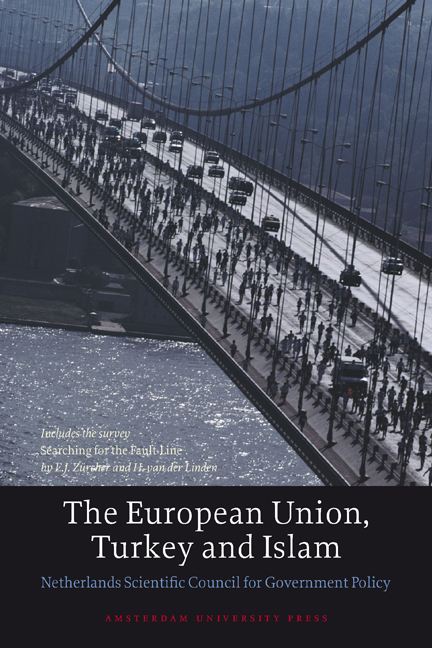Book contents
- Frontmatter
- Contents
- Summary
- Preface
- 1 Introduction
- 2 The European Union and Religion
- 3 Turkish Islam and the European Union
- 4 Conclusions
- Epilogue
- Literature
- Searching for the Fault-Line
- 5 Introduction: Turkey – Fault-Line, Frontline or Test Case?
- 6 Turkey’S Current Islamic Landscape
- 7 Turkish Islam and the Eu: a Clash of Civilisations?
- 8 Conclusion: Turkish Islam and European Civilisation
- Literature
- Websites
1 - Introduction
Published online by Cambridge University Press: 14 January 2021
- Frontmatter
- Contents
- Summary
- Preface
- 1 Introduction
- 2 The European Union and Religion
- 3 Turkish Islam and the European Union
- 4 Conclusions
- Epilogue
- Literature
- Searching for the Fault-Line
- 5 Introduction: Turkey – Fault-Line, Frontline or Test Case?
- 6 Turkey’S Current Islamic Landscape
- 7 Turkish Islam and the Eu: a Clash of Civilisations?
- 8 Conclusion: Turkish Islam and European Civilisation
- Literature
- Websites
Summary
BACKGROUND AND MOTIVATION
The debate on Turkey
During the Dutch Presidency of the European Union (EU) in the final six months of 2004, the EU will have to decide on whether to open membership negotiations with candidate member state Turkey. Officially, that decision depends on whether the country enjoys a stable constitutional democracy that guarantees the rule of law, human rights and minority rights – the so-called political Copenhagen criterion. In the public debate, however, other considerations have also played a role. Besides the many practical objections to Turkish membership (the country's size, poverty, rural nature or its many unstable neighbours), objections of a cultural-religious nature are increasingly being raised. In short, Turkey is alleged to have a different cultural-religious history from that of ‘Europe’ and an incompatible value system.
Up to now, the national governments of the member states, the European Commission and the European Parliament have nearly all adopted a wait-and-see attitude towards this debate. Insofar as issues of culture and religion play a role for politicians and ‘EU-watchers’, it involves the question whether Turkey is able to guarantee religious liberties. Hardly any of them have questioned outright whether an Islamic country such as Turkey fits in with the EU's ‘Judeo-Christian value system’. This reticence is perhaps understandable. After Turkey became an associate EU partner in 1963, European heads of government elevated its status to an ‘EU candidate country’ at the end of 1999 (see also text box 1.1). In doing so, they have already committed themselves in principle to a possible Turkish membership. Moreover, one would expect representatives of secular states especially to maintain some distance from making substantive judgements on religious issues (see sect. 2.3).
Even so, Turkey's Islamic character will inevitably become entwined in the political decision-making process. The German Christian-Democrats, for example, have already stated that they will make the question of Turkish accession a core issue in debates on the EU's future. Should accession negotiations with Turkey indeed begin and be successfully concluded, the issue will again become politically relevant in the not too distant future. This is because the accession treaty with the Union will have to be ratified by all member states either through referenda, or by the approval of national parliaments.
- Type
- Chapter
- Information
- The European Union, Turkey and Islam , pp. 15 - 24Publisher: Amsterdam University PressPrint publication year: 2004



